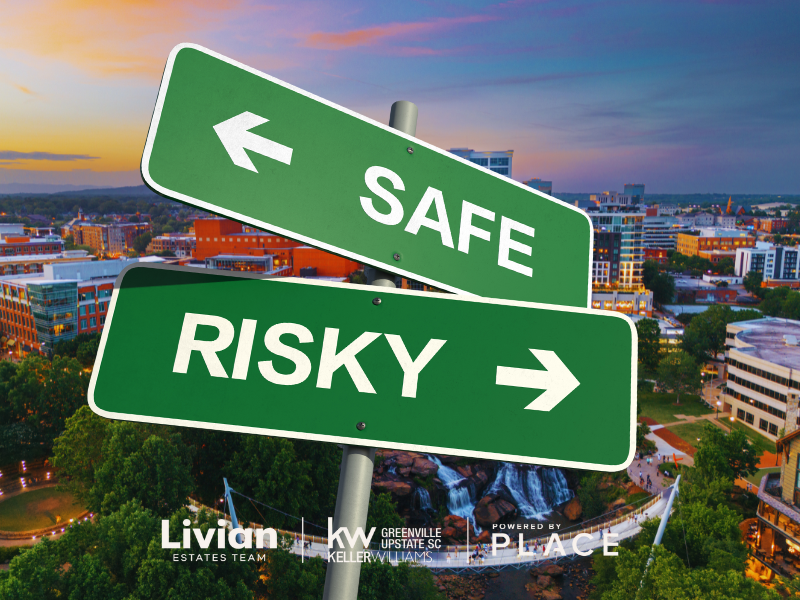Categories
GreenvillePublished October 20, 2025
Is Greenville, SC a Safe Place to Live?

Thinking about moving to Greenville and wondering if it is a safe place to live? Short answer: it depends, mostly on which part of Greenville you pick and how you want to live. The city has a lively downtown, growing suburbs, and some neighborhoods that are quieter than others. Below we’ll break down the facts, point out safer areas, give practical tips for home buyers, and answer common questions.
A quick snapshot of crime and safety
-
As of 2025, Greenville’s overall city-level crime rate is higher than the U.S. average according to crime-data sites (city totals are driven up by property crimes like theft and auto theft).
-
That said, local police data shows recent improvements: the Greenville Police Department reported a notable drop in crime (about a 16% decline for January–June 2025 compared to the same period last year). Greenville County Sheriff maps and the city’s crime tools let you check incidents by neighborhood.
Greenville, SC has a property crime rate of about 34 incidents per 1,000 residents, higher than the national average but typical for a growing city. Violent crime is around 6 per 1,000 residents, slightly above average but mostly limited to certain areas at night. Drug offenses and DUIs exist but are declining, thanks to stronger patrols and awareness programs. Most residents feel safe with basic precautions like security systems, good lighting, and awareness of their surroundings.
Where people feel safest
If safety is a top priority, look beyond “Greenville city” as a single thing and focus on neighborhoods and nearby towns. Areas often listed as safer or having low crime include parts of North Main, Augusta Road, Montebello, and several suburbs such as Travelers Rest, Simpsonville, and Greer. These communities have quiet streets and strong community ties.
How to check safety for the exact place you’re considering
-
Use the Greenville Police Department / Greenville County Sheriff interactive crime map — you can search by address and recent dates.
-
Look at both violent crime and property crime rates — many cities’ higher totals come from property crimes.
-
Visit at different times (day, evening, weekend) and talk to neighbors or a local agent for a real feel.
Practical tips for home buyers who care about safety
-
Get a neighborhood-level crime map for the past 12–24 months — trends matter more than a single event.
-
Ask about street lighting, sidewalks, traffic patterns, and nearby bars or late-night businesses: these affect how safe a place feels.
-
Check school ratings and local HOA activity — engaged neighborhoods often track with lower petty crime.
-
Meet neighbors: local Facebook groups or Nextdoor can give candid, recent perspectives.
-
Consider a home with a garage, good locks, and visible landscaping — small features reduce risk and improve resale.
FAQs
Q: Is downtown Greenville dangerous at night?
A: Downtown is lively and walkable with lots of restaurants and events. It sees more reported incidents than quiet suburbs, largely because it attracts more people. Use caution like you would in any busy city area (stay aware, avoid poorly lit shortcuts).
Q: Are car break-ins common?
A: Property crimes, including auto theft and break-ins, tend to be the largest share of reported incidents in Greenville. Lock your car, don’t leave valuables visible, and park in well-lit areas.
Q: Which nearby towns are safer than the city center?
A: Towns often mentioned as safer options include Travelers Rest, Simpsonville, and areas in northern Greenville County — but always check the block-level data for specific streets.
Q: Has crime been improving?
A: Local police reported a significant drop (about 16%) in crime for the first half of 2025 versus the prior year; national trends also showed declines in 2023–2024. That points to improving trends, but stay current — crime can shift.
Q: Should I avoid Greenville because of headline crime stats?
A: No, headline city stats are useful, but they hide neighborhood variation. Many people move to Greenville for its parks, schools, and job growth and find very safe neighborhoods. Do your neighborhood homework before committing.
Final thoughts
Greenville can be a safe place to live especially if you’re intentional about where you buy. City-level numbers are only the start. The best approach is to check crime maps for the exact address, visit at different times, and talk with locals. If you want help narrowing neighborhoods that match your safety needs, lifestyle, and budget, the Livian Estates Team can help you find the right fit without guessing.





